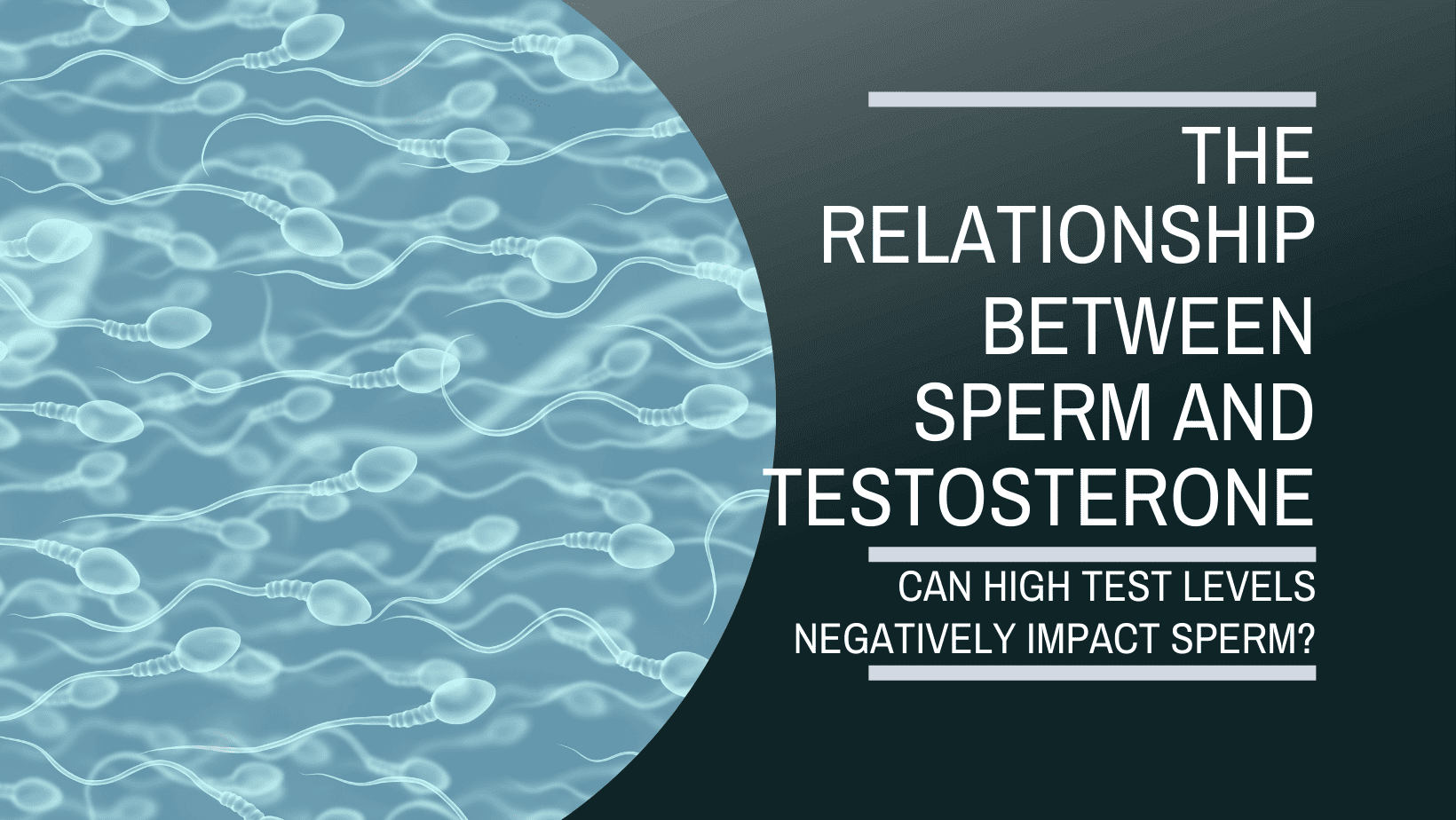The Relationship Between Sperm And Testosterone
How The Relationship Works
Did you know that in humans, sperm production is dependent on the reproductive hormone testosterone? It’s true: testosterone plays a huge role in the production and quality of sperm. Let’s take a closer look at this fascinating relationship between testosterone and sperm.
A study published in 2014 in the journal Fertility and Sterility showed that testosterone levels can have a direct influence on semen parameters. The study found that men with higher concentrations of serum total testosterone had significantly higher values for semen volume and total sperm count compared to those with lower serum levels of testosterone. Furthermore, men with abnormally low levels of this hormone often experience difficulty conceiving or may be completely infertile.
In order to understand how testosterone affects fertility, it’s important to know that this hormone contributes to spermatogenesis – the process by which sperm are produced. Testosterone helps promote normal sexual development, as well as healthy sperm production and maturation. It also helps regulate hormones like luteinizing hormone (LH) and follicle-stimulating hormone (FSH), which are necessary for normal male fertility. As such, any disruption to these hormones can negatively affect fertility outcomes.
It’s clear then that testosterone is more than just ones sex drive and ability to build muscle – testosterone has an important influence on male fertility, making it an essential component of healthy reproductive health. For couples struggling with infertility, it is important to consider factors like hormone levels when attempting to conceive naturally or through assisted reproductive techniques such as IVF. By understanding the role of hormones like testosterone in conception success, couples can make informed decisions about their treatment plan and increase their chances of achieving pregnancy.
Physical Characteristics Affected By Testosterone
Testosterone is a hormone that plays an important role in sperm production and physical characteristics. As such, it can have a major impact on men’s health and appearance. To understand this better, let’s look at the case of John Doe, a 42-year-old man who was recently diagnosed with low testosterone levels.
John’s doctor informed him that he had been experiencing a decrease in his sperm count for some time now and recommended treatments to raise his testosterone levels. After undergoing hormone replacement therapy for several months, John saw noticeable changes in his physical characteristics. His body fat decreased and muscle mass increased, giving him a more toned physique. He also experienced an increase in energy and libido.
These changes are typical for individuals with low testosterone who undergo hormone replacement therapy. The higher the testosterone levels, the more likely they are to experience these benefits—not just physical but mental as well. Men with higher testosterone can often feel more confident and self-assured as their physical features become more masculine. It’s clear that testosterone has an undeniable influence on both sperm production and men’s physical characteristics, making it essential for overall health and wellbeing.
Role Of Testosterone In Male Sexuality
The male sexual experience is a complex and intricate web of hormones and reactions, with testosterone at its core. Like a spider spinning its web, testosterone weaves together the physical and psychological characteristics that define male sexuality. Let’s explore the role that this powerful hormone plays in an individual’s sexual experience.
Testosterone is fundamental to the sperm production process. The hormone stimulates the development of sperm cells in the testes and increases their motility. Without sufficient levels of testosterone, sperm production is impaired, resulting in issues with fertility. Additionally, testosterone has long been associated with libido and sex drive in men. It helps to create healthy arousal levels and enhances orgasms by boosting nerve sensitivity during intercourse.
Beyond its effects on sperm production and libido, testosterone also plays a role in muscle growth throughout adulthood. This can lead to increased body confidence which boosts self-esteem and can help men feel more comfortable engaging in sexual activities. Therefore we can see that testosterone is essential for both physical health and mental wellbeing when it comes to male sexuality – a key component of reproductive health overall.
Testosterone is a crucial part of male sexuality – from affecting fertility through to body confidence – making it a vital factor for overall reproductive health. Its influence on physiology and psychology means it has far-reaching impacts on how men experience their sensuality, desire, arousal levels, performance, pleasure, and satisfaction during intimate encounters with partners.
Potential Side Effects Of High Testosterone Levels
We have written before about the effects of low testosterone in men, but what about the potential side effects of having too much testosterone? High levels of testosterone can have a number of potential side effects in men. While this hormone is essential for male health, having too much can lead to adverse consequences. It’s important to understand the risks associated with elevated testosterone levels and what can be done to mitigate them.
The most common side effect of high testosterone levels is an increase in acne breakouts due to increased oil production on the skin. This can cause excessive sebum activity, leading to clogged pores and blackheads. Additionally, some men may experience premature balding or hair loss due to their heightened levels of this hormone and its conversion into DHT which smothers the hair follicle.
In addition to physical side effects, high levels of testosterone may also lead to mood changes such as irritability or aggression. This is because the hormone has the ability to affect brain chemistry, which can lead to emotional instability. With proper treatment and lifestyle modifications, these potential side effects can be managed or even prevented from occurring altogether. Much of this has been attributed to the conversion of excess testosterone into estrogen which is still essential for males, but not in the doses some men experience. There are also issues with erectile dysfunction associated with higher than normal testosterone production.
Infertility is also an issue for men with higher than normal testosterone levels. Often this isn’t picked up on until they try to conceive and it is easily remedied, but is a side effect nonetheless.
It’s important for men with high levels of testosterone to talk with their doctor about any concerns they may have about their health and the potential for any side effects. Whilst more testosterone is a good thing there is also such a thing as too much. A healthcare professional will be able to provide guidance on how best to manage elevated testosterone levels and ensure overall well-being.
Benefits Of Balanced Testosterone Levels For Sperm Production
It’s no secret that testosterone plays an important role in male fertility. Take the case of a hypothetical man we can call Lou, a 35-year-old man with infertility issues. After undergoing tests and treatments, it became clear that his testosterone levels were significantly higher than normal. With his doctor’s help, Lou was able to reduce his testosterone to a balanced level and eventually father a child.
This story illustrates the importance of balanced testosterone levels for sperm production. Higher testosterone levels can have adverse effects on sperm quality and quantity; this is due to its role as an endocrine disruptor that interferes with other hormones involved in reproduction. On the other hand, balanced hormone levels help keep sperm healthy and viable for fertilization, increasing the chances of conception.
The benefits of balanced testosterone for sperm production are clear: it helps maintain optimal conditions for healthy sperm cells and increases the chances of successful conception. Additionally, lower testosterone levels also have positive effects on other health indicators such as libido and overall energy levels. For men looking to start a family or improve their fertility, maintaining balanced hormone levels is essential.
To Conclude
The relationship between sperm and testosterone is undeniable. Testosterone plays a key role in sperm production, as well as influencing physical characteristics and male sexuality. While a high level of testosterone can lead to unwanted side effects, men should strive to maintain balanced levels of this hormone in order to ensure healthy sperm production. Like a puzzle piece that completes the picture, testosterone is essential for male fertility.
Having the right amount of testosterone is like hitting the sweet spot; too little or too much can be detrimental. That said, it’s important for men to find their balance and monitor their hormone levels regularly if they are considering becoming fathers. In fact, being mindful of one’s testosterone levels could be considered an act of love towards any potential future children.
Ultimately, understanding the relationship between sperm and testosterone can help us maximize our reproductive health for generations to come. As the saying goes: knowledge is power—so let’s use that power wisely!









